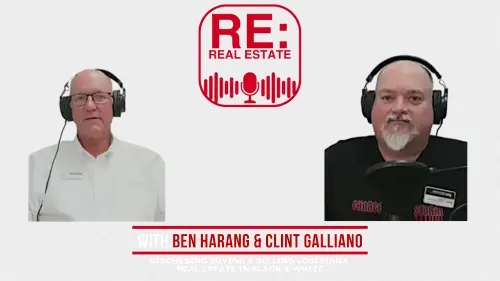Ep. 18 - Sellers: Post-Listing Pricing Strategies
Ben Harang (00:23)
Clint, good afternoon, how you doing man?
Clint C. Galliano (00:25)
You're doing wonderful, Ben. How you doing?
Ben Harang (00:28)
I'm doing terrific. ⁓ most of the time it seems like we're doing this on, Wednesday afternoons and the sun's shining. It warmed up from this morning. It's a gorgeous day outside.
Clint C. Galliano (00:40)
That it is, that it is. was running around pretty much all morning and I looked up and there was some light clouds in the sky, but it was such a pretty blue. It's like I almost wanted to go do everything outside, but the sun started warming up and I said, I'm going in the air conditioning.
Ben Harang (00:56)
Yeah.
Yeah. Had a little crawfish to eat yesterday at lunch, ⁓ with a little gathering at KW in Houma that was a good time. So, time for another podcast. what's the, what's the topic today, Clint?
Clint C. Galliano (01:16)
Today is pricing strategies post-listing. So that's if it doesn't sell immediately.
Ben Harang (01:21)
Alright.
All right. Let me take a stab at that. you and I talk a lot and we were talking about how important it is to get the price right when the market, when the price first, when the property first hits the market. But I mean, we did a previous episode about how to prepare the property to get it to market and give you the best chance to sell it. And if you do all the things we suggest,
Clint C. Galliano (01:29)
All right.
Ben Harang (01:54)
and then we come back and put the house on the market for more than it's worth, all of that effort will be wasted from a time standpoint. I'm a firm believer in that the closer we can list the price, list the house to the ultimate sales price, the faster it'll sell and for more money. If we have it up above the actual market value and leave room to negotiate,
You you the buyers will make you negotiate or negotiate lower than The actual price of the property maybe so if you if you get it if you get it real close get it real tight There'll be less room to negotiate if any at all And if somebody wants to make you an offer and it's less than the value of the house, you know what that value is You can just count it back at the at the list price If you if you over price it and you find somebody that wants to buy it
for for your overpriced list price the appraisers coming back on ninety nine percent of the sales and he's looking at here she's looking at the same information we're looking at to develop the price not to say will always be exactly the same but if we don't think it's worth if we think it's worth two hundred thousand dollars there's no reason why the appraisal would think it's worth two thirty two fifty
Get it right the first time and you'll have a lot better chance of selling the price, selling the house in a timely manner than just sitting there wondering why your house doesn't sell.
Clint C. Galliano (03:39)
Yeah, that's an important point. When we go to list houses and we recommend pricing, invariably we would get sellers that say, well, I want to list it at this and for the reasons like you said. Well, I want to give them some negotiating room because they're going to always ask for us to come down on the price. So I want to price it a little bit higher so I can get a little bit more. Some cases they may be restricted by
the equity that they have. And so that's why they're trying to base it on. But with that, the equity is what it is, what it sells at. Hopefully, they're not underwater for where they need to be to close out that loan. But ultimately,
We recommend the price and that's based on previous sales and where we think the market is heading. And likely that's about where it's going to wind up selling at. And it's almost like a rubber band effect. If you price it high and then you have to start dropping the price, you're going to go way below what it probably could have sold at if you had listed it at the proper price.
Because at that point you're chasing the market and people will look at that house and wonder what's wrong with it. They'll think about it like some five day old bread on the shelf at the grocery store.
Ben Harang (05:14)
It gets stale. I refer to some buyers and it's not a knock on anybody. It's just human nature sometimes. Most of us shop at big box stores a lot and you go in to buy something and you look at the price. If the price is too high, you just don't buy it. You don't negotiate price with the big box stores. Some people bring that same mentality to real estate.
If the house is listed for 230 and in the $200,000 range, they'll tend not to make an offer for $200,000 on that listing that's listed for 230 because they don't buy and sell houses or buy and sell real estate regularly. Now the agent can give them advice and counsel, but it just, it becomes more problematic if it's listed higher than the market value of the house.
If you price it right, there are buyers out there to buy your house. We're in a challenging market right now with the interest rates are nationwide issue. They're in the 6 plus percent range right now, which in my mind historically is competitive. But we also have an insurance issue between homeowners and flood insurance. You and I were talking about somebody's looking at a
$1,000 for between insurance and taxes a month in addition to the principal and interest on a loan that becomes problematic for a lot of people to to pony up another $12,000 a year just for for insurance and property taxes. So, you it you price it right. There's still challenges when you price it right, but you can typically get through those challenges.
Clint C. Galliano (07:13)
And so I wanted to briefly touch on some good tools and a way not to use for pricing it.
Ben's chuckling because I told him my idea. He knows where I'm going with it.
Ben Harang (07:28)
and the way you're going with that.
No, we didn't
talk about this one before. Let's see if I'm right.
Clint C. Galliano (07:34)
Well, we haven't talked
about it on a previous episode, but I kind of mentioned it to them before we started recording. So we typically use a comparative market analysis. Like I said, a couple of minutes ago, we'd look at previous sales of similar homes and that's how we develop the comparative market analysis. Another option is for you as the seller to get an appraisal.
Ben Harang (07:39)
Yeah.
Clint C. Galliano (08:04)
And so that's one appraiser's opinion of the market value of the home. It doesn't necessarily mean it's going to sell at that price. That's a snapshot in time on what that appraiser thinks the price of the home is. So that's an option also. Some people get the warm fuzzies because they've got an appraisal professional giving them what the price of their home should be.
The option that's not that great, well there's a couple of options that aren't that great. Looking at the Zestimate Just because Zillow says that your house is worth this doesn't mean that it's worth it. And if your buddy down the street sold his house for a certain price and you feel your house is better and he sold his house two years ago and you want to sell your house for more money than he sold his house two years ago.
That's not a good option for pricing also, even though you feel your house is better or bigger or looks nicer. It doesn't matter. That was a different market. So Zillow and your buddy's house that sold two years ago are not a basis to price your house to sell today.
Ben Harang (09:17)
You know, we go back in history to find houses that are in a similar condition, location, and size. We like to stay within six months. We can go back to 12 months if we have to go back that far to find comparable sales.
But if we're in a decreasing market, which we're not right now, we think we're kind of flat. But if we're in a decreasing market, every time we change the price, we're chasing that decreasing number where if we priced it right out the bat, price would be right and their buyers at the right price. You talked about the appraisal. I've come to understand over 30 years that
We're looking at the same house. We're looking at the same information, but appraisers are looking in a review mirror. They're based their appraisal on historical data. We're looking through the front windshield of the automobile. We're looking forward to see what we think the house will actually sell for. So in a decreasing market, the appraisal is going to be high because it's looking at aged data.
So today's market would be less than that appraisal, even though the appraisal is dated today. In an increasing market, the appraiser is looking in a review mirror, and he's looking at age data that's lower than the market today. So looking through the windshield, we can see a rise in the price maybe. So we're looking at the same data, but we're looking at it differently.
which is why sometimes the CMA that we do, the comparative market analysis that we do, and appraiser are different because we're looking at the same data but looking at it through two different prisms.
Clint C. Galliano (11:26)
Yeah, we actually had some of the increasing market issue with appraisals back after Hurricane Ida. As some of the homes would come on the market, they were looking at, or I should say in the timeframe after Ida, homes were being repaired, were in good shape, and they were looking at lower pricing and pricing of not repaired homes as comparables.
Ben Harang (11:32)
Mm-hmm.
Clint C. Galliano (11:54)
And so we're having trouble getting some appraisals to match contract price on these homes. It eventually balanced out and we're kind of while we're above the what's historically considered a balanced market at six months of inventory, we're roughly about eight, give or take a few points. It's still more of a normal market than.
Ben Harang (12:00)
Mm-hmm.
Clint C. Galliano (12:22)
what we saw in the past from 20 to beginning of 23.
Ben Harang (12:28)
And after Hurricane Ida, some of what we saw, if you had a house that was not damaged and people lost their house, there was a lot of pressure to buy the house that was not damaged. So the people that were homeless were offering more money than they were listed for or more money than they were really worth. And after things calmed down, people were pointing to those sales to justify
Clint C. Galliano (12:43)
Yeah
Ben Harang (12:58)
the list price or the sales price and the appraisals were like timeout that that the situation that caused that to happen is over. Like nobody's homeless. Everybody found a place to live. So the pressure to increase those prices abnormally is over. appraisals told me that for a period of time, they didn't use anything that closed within six months of hurricane Ida. They used before or after.
⁓ just because the market was crazy. you had damaged property, you had undamaged property that, ⁓ there was pressure to, on the buyers to get it. So they were willing to pay more. ⁓ it was just a wild time in the business for about six months after I, ⁓ and then things calmed down and we kind of got back to a, a normal, normal market as normal as you can.
be at 3 % interest. And then the interest started bumping up and that really kind of leveled the playing field again.
Clint C. Galliano (14:06)
Yeah, that time period was kind of a free for all for anybody that had money in their pocket. You know, for the lucky ones who got payouts on their insurances, they had the money in their pocket and they were like, oh, it's a $225,000 house. My house was destroyed. I've got $275,000 in my pocket. Here you go.
Ben Harang (14:12)
Yeah.
Yeah. Well, that happened. just, I hate to see that happen, ⁓ for the people that are buying it, but we don't, we, we don't make those decisions for them. And we, while we try to understand what people are going through, sometimes we just can't. They, they feel so much more pressure than, than we see. ⁓ they just want to be done with it and need a place for their family to live. And that's what created the market after Ida.
So we're not in a declining market, but like you said, we have a little more than six months worth of inventory. So technically it's a buyer's market, but it's pretty stable.
Clint C. Galliano (15:16)
So in summary, what we want to do is, and like we talked about in the previous episode, make sure your house is in great shape, good presentable shape, have it staged, price it right for the market. Don't worry about trying to squeeze every drop of blood out of a stone.
accept that this is what it is and don't try to be greedy. And ultimately, and I think I've said this before, comes down to do you want to wait and maybe miss your price point or get less than what you want or do you want it to sell right now? Most people want it to sell right now. So price it right, get it on the market, make sure that it's
looking great and present its best face forward and it'll we'll find the right buyers for it.
Ben Harang (16:21)
And also if you're selling your house, it's overpriced, it doesn't sell. Or you list your house, it's overpriced, it doesn't sell. Whatever motivation you have for selling the house, you can't proceed. You can't go on with life, whether you're moving out, moving up, moving down. Whatever you want to do in life, you're not able to do that because the house isn't selling. So I tell people it's like having money in the bank.
If you have $10 in a bank, you can't take out 12. You can take out 10. Same thing with real estate. You just don't have a balance every month to tell you exactly what you have. It's our best educated estimate of the value.
Clint C. Galliano (17:08)
All right. So if you've got any further questions about pricing strategy or selling in general or really anything real estate, don't hesitate to reach out, email us, text us, call us, leave a comment.
Don't forget to like, subscribe, and comment, and share with all your friends so they can get all of this interesting real estate goodness from us two sexy face for radio guys.
Creators and Guests



